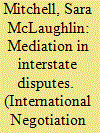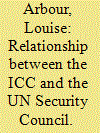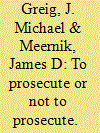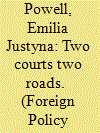|
|
|
Sort Order |
|
|
|
Items / Page
|
|
|
|
|
|
|
| Srl | Item |
| 1 |
ID:
133973


|
|
|
|
|
| Publication |
2014.
|
| Summary/Abstract |
Though it was initially presumed that the primary role of the International Criminal Court (ICC) would be a residual one of monitoring and ensuring the fulfilment by the State of its obligations under the Rome Statute, it has over time moved towards a more activist "burden-sharing" role. Here, the Office of the Prosecutor initiates prosecutions of the leaders who bear the most responsibility for the most egregious crimes and encourages national prosecutions for the lower-ranking perpetrators. Since at least 2006, the Prosecutor has committed to a formal policy of inviting and welcoming voluntary referrals as a first step in triggering the jurisdiction of the Court. The judges on the Court have approved these referrals, while the broader academic and activist communities welcomed this more vertical relationship with national jurisdictions and, significantly, have provided the intellectual justifications for it. Burden-sharing, a concept unmentioned at the Rome Conference establishing the ICC, is presented as an unproblematic, natural and organic emanation from the Statute. This article argues that this development was not in fact inevitable or mandated by the Rome Statute. It was chosen, and in justifying this choice, familiar modes of cosmopolitan-constitutionalist treaty interpretation fundamentally premised on the field's virtue and indispensability have operated to enable a Court established as a residual watchdog to become a workhorse in individual situations by assuming the preponderance of responsibility for combating impunity.
|
|
|
|
|
|
|
|
|
|
|
|
|
|
|
|
| 2 |
ID:
133146


|
|
|
|
|
| Publication |
2014.
|
| Summary/Abstract |
This commentary provides a brief summary of the articles in this special issue and emphasizes four questions raised by this research: 1) ways to define and measure mediators' strategies, 2) teasing out demand side factors from supply side factors in mediation, 3) capturing differences between states and international organizations as conflict managers, and 4) understanding the role of particular conflict management actors like the International Criminal Court.
|
|
|
|
|
|
|
|
|
|
|
|
|
|
|
|
| 3 |
ID:
130701


|
|
|
|
|
| Publication |
2014.
|
| Summary/Abstract |
THE POWER OF THE UNITED NATIONS SECURITY COUNCIL TO REFER COUNTRY situations to the International Criminal Court (ICC) has been hailed, particularly among international human rights activists, as a chance to expand the reach of international criminal justice by offering the opportunity to hold accountable perpetrators of atrocities who might otherwise be exempt from prosecution and punishment. The historic referral of the situation in Darfur in March 2003 was widely welcomed as an important step in the fight against impunity as was the Security Council's later, and more controversial, referral of Libya in February 2011. In principle the expansion of the reach of accountability is something to be welcomed, but it is important to recognize the costs of this expansion as well as the danger that they may outweigh the intended benefits.
|
|
|
|
|
|
|
|
|
|
|
|
|
|
|
|
| 4 |
ID:
130970


|
|
|
|
|
| Publication |
2014.
|
| Summary/Abstract |
Many conflicts in the Asia-Pacific region have included sexual violence crimes targeted primarily against women. However, in comparison to other regions, Asia-Pacific states have been reluctant to embrace international law innovations to end impunity for such crimes into the future, as evidenced by their unwillingness to become signatories to the Rome Statute of the International Criminal Court. Of the 39 countries constituting the Asia-Pacific region, only 17-less than half-have joined the Rome Statute. This article initially surveys some of the reasons for non-ratification of the Statute. It further examines the role of civil society and the potential normative impact of the Statute to enhance national sexual violence legislation and prosecutions. Finally, it identifies some practical steps that the Australian government could take to encourage regional states to ratify, implement and enforce the Rome Statute in order to further protect all victims of international crimes and bolster the broader Women, Peace and Security framework.
|
|
|
|
|
|
|
|
|
|
|
|
|
|
|
|
| 5 |
ID:
133151


|
|
|
|
|
| Publication |
2014.
|
| Summary/Abstract |
The International Criminal Court (icc) came into force in July 2002 with the potential to drastically alter both the war fighting and peacemaking behavior of states. The icc is designed to try and subsequently punish those found guilty of war crimes, crimes against humanity, and genocide. Supporters of the icc have argued that its establishment will erode the norm of impunity that state and military leaders have historically enjoyed. Yet, another logic suggests that the initiation of an icc investigation or the issuance of an arrest warrant for individuals embroiled in an ongoing dispute may make matters worse. Such individuals may see little reason to stop fighting and reach a settlement if conflict resolution results in their detention in The Hague. Indeed, suspected war criminals and their patrons may wish to escalate their violence in order to avoid showing any sign of weakness or possibility of capitulation lest their enemies press the fight or their rivals seek to undermine their authority. In this article, we explore the potential impact of the icc on the likelihood of peace by examining the impact of actions by the icc - the initiation of investigations into conflict situations and the issuance of arrest warrants for those suspected of committing violations of international law - on the likelihood of mediation. Our findings suggest that while icc arrest warrants can encourage mediation, the initiation of investigations by the icc can actually undermine the occurrence of mediation.
|
|
|
|
|
|
|
|
|
|
|
|
|
|
|
|
| 6 |
ID:
133974


|
|
|
|
|
| Publication |
2014.
|
| Summary/Abstract |
This article explores the conceptual relationship between trafficking in human beings, enslavement and crimes against humanity. The analysis of case law of the International Criminal Tribunal for the Former Yugoslavia and the European Court on Human Rights reveals that, while trafficking in human beings and enslavement are increasingly overlapping, they still do not coincide. Moreover, enslavement is only a crime against humanity if it is committed in a widespread or systematic manner by an organization which displays State-like features. In the opinion of the author, the qualification of human trafficking as "modern slavery" is therefore confusing. The fact that human trafficking covers a wide array of offences influences the choice of forum in respect of criminal law enforcement. While enslavement as a crime against humanity may belong to the jurisdictional realm of international criminal tribunals and the International Criminal Court (provided that domestic jurisdictions have proved to be "unwilling" or "unable"), other forms of human trafficking are, in the view of the author, best left to national courts.
|
|
|
|
|
|
|
|
|
|
|
|
|
|
|
|
| 7 |
ID:
124600


|
|
|
|
|
| Publication |
2013.
|
| Summary/Abstract |
The International Court of Justice (ICJ) and the International Criminal Court (ICC) constitute two prominent international courts. However, there exists considerable variation in states' support for these two institutions. The Rome Statute, which recognizes the jurisdiction of the ICC has been ratified by over half the states in the world; only a third of states accept the compulsory jurisdiction of the ICJ. How are we to understand this variation in state support for these two courts? I argue that there is an inherent link between the quality of a state's domestic legal system (rule of law) and perceived legitimacy of an international court. Empirical analyses of states' support for the ICJ and the ICC show that rule-of-law states lend support to the ICC, a court perceived by the international community as legitimate. Alleged bias of the ICJ has, on the other hand, substantially weakened support for this court among rule-of-law states.
|
|
|
|
|
|
|
|
|
|
|
|
|
|
|
|
|
|
|
|
|